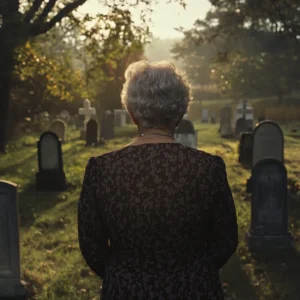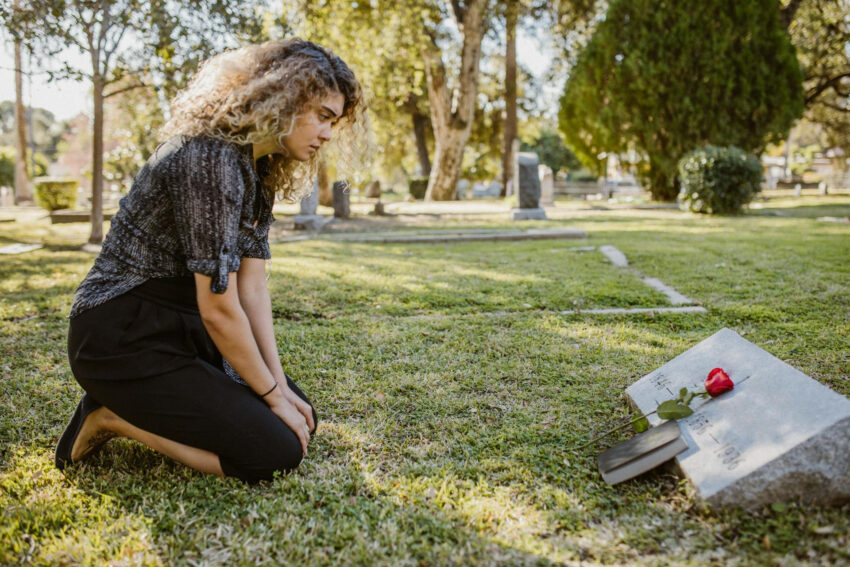For 23 years, I never missed this date. Every year, I baked Henry’s favorite apple and cinnamon pie and brought it to his grave. It was a simple pie, but it had always been his favorite since he was a child. The aroma of apples and cinnamon used to bring him running to the kitchen, eagerly asking, “Is it ready yet, Mom?” His voice still echoed in my mind as if he were right beside me. Henry was only 17 when he passed away—far too young. The accident took him from me, and the pain of that day never truly faded. Time didn’t heal all wounds, but this annual ritual gave me a sense of closeness to him, as if he were still part of my life in some way.
This morning, I baked the pie with the same care as always and headed to the cemetery, as I had done for over two decades. When I reached Henry’s grave, my heart ached. I kept his resting place neat, adorned with fresh flowers. The gravestone, now smooth from years of my fingers tracing his name, stood as a testament to the time that had passed.
I knelt down and gently placed the pie on the stone. “Hi, sweetheart,” I whispered, my voice trembling. “I hope you’re at peace. I brought your favorite pie again. Remember how we used to bake it together? You always sneaked a taste before it was done.” A bittersweet smile crossed my face as tears welled up. “I wish we could bake it together one more time, Henry,” I said softly. I kissed my fingertips and touched the gravestone gently. “I love you, sweetheart.”
The next day, I returned to collect the pie dish, as was my routine. Usually, the pie remained untouched or spoiled by the weather. But this time, the pie was gone. In its place was a note with two words: *Thank You*. I stared at the note in disbelief, my heart racing. Anger and confusion swirled within me. That pie was meant for Henry. How could someone take it? It felt like a violation, as if someone had stolen a part of my grief. I was determined to find out who had taken it.

That night, I baked another pie and returned to the cemetery the next day. This time, I didn’t leave. I hid behind a large oak tree, watching the grave intently. Hours passed, and just as I began to think no one would come, I saw a small figure approach. It was a boy, no older than 9, dressed in thin clothes unsuitable for the cold. He scribbled something on a piece of paper and placed it on the gravestone before hesitantly reaching for the pie.
I stepped out from behind the tree, and the boy froze. “I’m sorry! I’m really sorry!” he cried, dropping the pie in his panic. “I didn’t mean to steal it. I was just so hungry! Please don’t be mad!” His fear melted my anger. He looked pale and underfed, his face etched with desperation. I knelt to his level and spoke softly. “It’s alright. I’m not mad. What’s your name, sweetheart?”
“Jimmy,” he muttered, avoiding my gaze. I asked about his parents, but he shook his head, tears filling his eyes. My heart broke for him. “I didn’t mean to steal,” he said. “I… I don’t get to eat much. That pie was the best thing I’ve ever had.”
“Oh, sweetheart,” I said, brushing a stray hair from his face. “You must’ve been so hungry. Come with me, Jimmy. I’ll bake another pie just for you.” He hesitated but eventually nodded, clutching my hand tightly as we walked to my house.
At home, I baked another pie while Jimmy watched quietly. When it was ready, I set it in front of him. His eyes lit up as he took a bite. “This is the best pie I’ve ever had,” he said between bites. Watching him eat with such joy reminded me of Henry, and for the first time in years, the pain in my heart felt less sharp.
Perhaps this was Henry’s way of sending me a message—that love and kindness weren’t meant to stay bottled up in grief. They were meant to be shared, to bring light to those who needed it most. As Jimmy finished the pie, a deep sense of peace washed over me. It felt as if Henry had brought Jimmy into my life. I ruffled his hair gently and said, “You don’t have to worry anymore, Jimmy. You’ll always have a place to come to now.”

